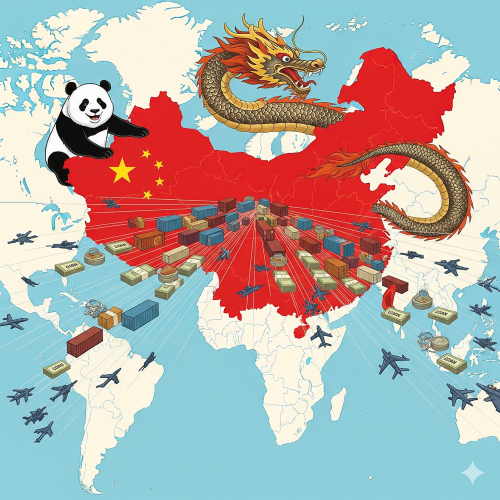How does China’s technological rise (AI, 5G, semiconductors, TikTok) influence U.S. debates about innovation, regulation, and security?

China's technological rise significantly influences U.S. debates about innovation, regulation, and security by presenting a clear and formidable challenge to America's long-held technological leadership.
This challenge is viewed by many as a zero-sum competition, forcing the U.S. to re-evaluate its traditional approach to technology and its relationship with the private sector.
Innovation: From Cooperation to Competition
For decades, the U.S. operated on the principle that its free-market system and private sector-led innovation were a guaranteed recipe for technological dominance. China's state-led model has challenged this assumption, sparking a fundamental debate in the U.S. about how to foster innovation.
-
The State vs. The Market: China's government has made AI, 5G, and semiconductors central to its national strategy, investing heavily in state-owned enterprises and directing resources at a scale the U.S. government has rarely attempted. This has forced American policymakers to debate whether the U.S. government needs to play a more active role in guiding and funding research and development (R&D) in critical sectors. The CHIPS and Science Act, which provides billions of dollars in subsidies to boost domestic semiconductor manufacturing, is a direct result of this debate. It represents a significant shift away from the traditional U.S. model and a move toward a more industrial policy-oriented approach.
-
Talent and Data: China's rise has also fueled debates about the U.S. talent pipeline and access to data. China's large population gives it a massive data advantage, and some U.S. officials have expressed concern that China's lack of privacy laws allows it to use this data for AI development and other purposes that are a national security risk. Additionally, the number of top scientists and researchers in China is rapidly growing, leading to a debate in the U.S. about how to attract and retain the best talent to maintain its innovative edge.
Regulation: Balancing Security and Openness
The rise of Chinese technology firms has forced the U.S. to grapple with how to regulate technology with ties to a foreign adversary, creating a complex debate that pits national security concerns against the principles of a free and open economy.
-
5G and Supply Chains: The debate over Huawei's role in 5G networks is a prime example. The U.S. government, citing China's National Intelligence Law, has argued that Huawei's equipment could be used for espionage or sabotage. This has led to a major policy push to ban Huawei from U.S. networks and a call for allies to do the same. This debate has forced policymakers to confront the reality that a cost-effective, global supply chain can also be a significant national security vulnerability. It has led to a focus on "de-risking" by reducing critical dependencies on Chinese technology.
-
Data and Social Media: The popularity of TikTok has brought the debate over data privacy and foreign influence to the forefront of American politics. Lawmakers from both parties have expressed concern that the Chinese government could use the app's algorithm to spread propaganda or access sensitive data on American users. This has led to a bipartisan push to force TikTok's Chinese parent company, ByteDance, to sell the app's U.S. operations or face a ban. The debate is not just about security, but also about the power of social media to shape public opinion and the need for new regulations to protect user data and information integrity.
Security: From a Military to a Technological Threat
China's technological rise has fundamentally changed the U.S. national security debate. The threat from China is no longer viewed as purely military; it is a geopolitical, economic, and ideological challenge that is intertwined with technology.
-
Cybersecurity: Chinese state-sponsored cyberattacks, often targeting U.S. companies and government agencies, have become a major concern. These attacks are often aimed at stealing intellectual property and sensitive data, which is then used to fuel China's technological development and military modernization. The U.S. government has been forced to re-evaluate its cybersecurity strategy and invest more in defending its networks from these sophisticated attacks.
-
Techno-Nationalism: The competition has created a new era of techno-nationalism, where technology and national security are inextricably linked. The U.S. government's decision to restrict the export of advanced semiconductors and chip manufacturing equipment to China is a clear example of this. The goal of these restrictions is to slow down China's progress in key technologies like AI and supercomputing, which have significant military applications. This has led to a debate about whether such restrictions can be effective without harming U.S. companies that rely on the Chinese market.
-
"Military-Civil Fusion": China's strategy of Military-Civil Fusion, which aims to leverage civilian technology for military purposes, has further heightened U.S. security concerns. This strategy blurs the lines between commercial and military technology, forcing the U.S. to adopt a more aggressive approach to investment screening and export controls to prevent U.S. technology from falling into the hands of the Chinese military.
- Questions and Answers
- Opinion
- Motivational and Inspiring Story
- Technology
- Live and Let live
- Focus
- Geopolitics
- Military-Arms/Equipment
- Segurança
- Economy
- Beasts of Nations
- Machine Tools-The “Mother Industry”
- Art
- Causes
- Crafts
- Dance
- Drinks
- Film/Movie
- Fitness
- Food
- Jogos
- Gardening
- Health
- Início
- Literature
- Music
- Networking
- Outro
- Party
- Religion
- Shopping
- Sports
- Theater
- Health and Wellness
- News
- Culture

